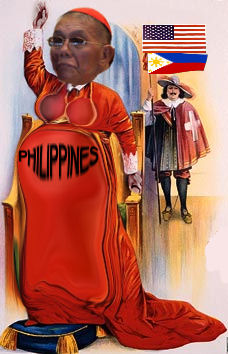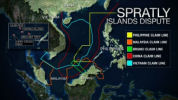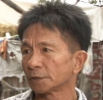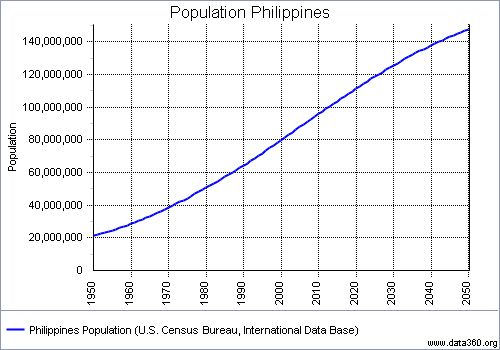 President Marcos institutionalized a national family planning program by creating a Population Commission (POPCOM) to study the issue and advise on a national policy. The focus of the commission was to decelerate the nation’s high fertility rates, yet consensus on how this was to be accomplished was considered problematic and, at best, unclear. Catholic sociologists brought an increased awareness of population problems and RCC officials started to become involved in the government birth control plan, making no objections and even sat on the POPCOM board. Obviously this concensus did not last. What happened?
President Marcos institutionalized a national family planning program by creating a Population Commission (POPCOM) to study the issue and advise on a national policy. The focus of the commission was to decelerate the nation’s high fertility rates, yet consensus on how this was to be accomplished was considered problematic and, at best, unclear. Catholic sociologists brought an increased awareness of population problems and RCC officials started to become involved in the government birth control plan, making no objections and even sat on the POPCOM board. Obviously this concensus did not last. What happened?

Government in the Philippines
The Philippines has had many colourful presidents. Three have died in office, two overthrown in popular uprisings, Rodreigo Duterte is just the latest and has gained notoriety by encouraging people to commit murder. In his inauguration speech he told the nation:
"If you know of any addicts, go ahead and kill them yourself"
Unfortunately many have done just that after the president offered substantial rewards to anyone who turns in a drug dealer ‘dead or alive’ resulting in 3600 killings in his first 100 days of office. President Marcos hung onto office for 20 years until overthrown by Cory Aquino. This extraordinary lady managed to not only oust the brutal and corrupt President Marcos, becoming the 11th President of the Philippines and the first woman to hold that office and the first female president in Asia. She also managed to withstand seven attempted military coups against her, a devastating earthquake and a volcanic eruption that led to the closure of the US military bases and almost swallowed an Australian ship[1] that happened to be in dry dock at the time.
Another battle fought out of the public eye: population policy
But while these events created world headlines, there was another and far more important battle being fought out of the public eye, one that, if the result had gone the other way would have changed the entire world for the better. In the mid-1950's, researchers in the Philippines believed that the country’s population, then under 20 million, could easily support a population of 2.5 times its size. During this time the country leaders and Church officials saw no need for population control, since overpopulation did not exist in the Philippines. Yet, later in that decade, Jesuit demographers recognized that although the Philippines may not have an immediate population problem, the rate of growth was such that severe problems would arise in the near future.[2] Coming from the Catholic church, this may seem surprising, but their position on population has always been inconsistent. In the Church's early history, Thomas of Aquino (1225 – 1274), an Italian Dominican friar, Catholic priest, Doctor of the Church and now a saint, believed that it was not possible for a country to allow unlimited growth and he approved of laws limiting population size. He probably wasn't the first to reach this conclusion but it puts him about 800 years ahead of many politicians today. However the decline in the number of Catholic faithful in Europe prompted Pope John Paul to encourage Brazilian couples to have more children to help solve the shortage of priests in the world.
President Marcos and Father Lynch
Early in his presidency Marcos solicited the United States Agency for International Development (USAID) to assist his government in initiating population control measures, a process that had to be achieved discreetly by masking some of its family planning assistance through larger programs on maternal and child health. However Church support for population control through family planning increased, as many in the church began to seriously react to the country's population growth rate. By identifying population growth as a crisis and calling on the Church in Manila to take action, Frank Lynch, a Jesuit priest, called on other priests to take responsibility to further discuss population concerns with the body of the Church. Specifically, he wrote that:
It is my hope, shared (I dare say) by the majority of well-educated Catholics in the Philippines that the Church may soon speak more directly to their members, telling them in clear and certain terms...that the folk or folk-Catholic belief that one should place no control on family size or child spacing is opposed to the Church's official position on the responsibility parents have toward children.... Catholic bishops and priests...have to speak openly and often against the false morality of those who extol large families and abandonment to Divine Providence as a prima facie evidence of supreme virtue.
As a result, the Roman Catholic Church (RCC) and the government began to work together to address the issue of population growth in the Philippines. President Marcos institutionalized a national family planning program by creating a Population Commission (POPCOM)[3] to study the issue and advise on a national policy. The focus of the commission was to decelerate the nation’s high fertility rates, yet consensus on how this was to be accomplished was considered problematic and, at best, unclear. At the time Lynch delivered his message, other Catholic sociologists brought an increased awareness of population problems and RCC officials started to become involved in the government birth control plan, making no objections and even sat on the POPCOM board. When POPCOM was first established, the RCC insisted that the rhythm method be included in the methods offered, but did not insist on the exclusion of other forms of contraception. Rather than either acceptance or condemnation of contraception, there was a tacit agreement by the Catholic hierarchy not to raise the issue. This cooperation was sustained for many years, but would later have a bitter parting.
Reactionary 1980s: World Bank, other agencies
As the 1980s approached, POPCOM began to lose support and was repeatedly challenged by researchers who felt that an increase in population was needed for economic development. Withdrawing from POPCOM, the RCC began to challenge the government program with the sense that "it is not the number of people but the unequal distribution of income which causes poverty." Critics of the RCC argued that the big debate in the Philippines regarding population and development was not over the redistribution of resources, but about the morality of managing population growth through the use of artificial means of contraception.
Further harming the potential growth of a strong population control policy at that time, the RCC began to publicly damage the advances previously made in support of a government family planning program. The government began to be attacked for having a population control orientation and, likewise, services suffered in their efforts to provide family planning assistance in the hopes of reducing the rapid population growth rate. In response to POPCOM's weakened efforts, Catholic bishops declared the government program unjust because it used money that could have gone to alleviating poverty, was based on the false assumption that population growth hinders economic growth and was supported by the World Bank and “other agencies”.[2] Such language set government and church leaders on opposite ends of the spectrum and divided program supporters.
Cardinal Sin
All of this damaged POPCOM, but may not have proved fatal were it not for Marcos's unpopularity and his involvement in the assassination of political rivals. The leader of the Catholic Church in Manila, a Cardinal with the unlikely name of Sin, (he referred to his home as the house of Sin) was an outspoken critic of the Marcos Government and waged a campaign to prevent the imposition of population-control policies. His speeches included the claim that the Philippine Government should follow the church because the Philippine population is predominantly Catholic. It is therefore bound under pain of sin to obey the teachings of the Catholic Church. The concept of separation of church and state has always been a difficult concept for the religious. Priests throughout Manila preached sermons about the sanctity of life and the blessing of motherhood after an announcement on July 6th 1982, by Prime Minister Caesar Virita, that steps must be taken immediately to prevent the Philippine population, at that point 50 million, from eventually exceeding 115 million, the upper limit of the country's resources.[4]
Cory Aquino
Marcos was eventually ousted and Cory Aquino rose to power by the true vote of the people, but her support for a population control program became a victim of her need for Church support. As a result the government program took more of a pro-natalist and child welfare stance as a requirement for the full participation of the RCC.
Alliance for Family Life International (AFLI)
As the only Christian Southeast Asian country, the Philippines still has one of the regions highest rates of population growth with its population now at over 100 million, up from 20 million in 1950. Twenty six percent of the population are living below the poverty line.[5] There is an estimated 4 million slum dwellers in Manila alone, many with large families with up to10 children because the only the comparatively well off have access to contraceptives. Abortion is illegal with no exceptions for endangering a woman's life, rape, or fetal impairment. This is a position taken by a group called the Alliance for Family Life International (AFLI) which attempts to advance a non-medical definition of pregnancy in the hopes of not only making contraceptive implants unavailable to Filipino women, but who would also prefer to see the whole Philippine POP Law tossed into the dustbin of history.
The illegality of abortion has only made it more dangerous. Estimates in 2012 show that 610,000 women resorted to abortion,[6] over 100,000 women were hospitalized and 3 women die every day due to unsafe abortion complications. Forty percent of Filipinos considered “having enough to eat” every day among their biggest problems and while unemployment is officially 6.1% wages are minuscule for the unskilled.
Cheap labour at home and cheap migrant labour source
In order to survive, many seek employment outside the Philippines, especially in the middle east and Japan, where they work as domestic servants or “hostesses,” which usually means prostitution. Poor families are forced to allow their children to be taken away from their families with the promise of good wages and a new life and even education, but wind up trapped by broken dreams, debt and the threat of violence. There are an estimated 4 million enslaved or exploited in child labour in the Philippines by a number of industries ranging from domestic service, mining, fishing, sugar plantations, to commercial sex and the selling of drugs. To add insult to this list of injuries, economists claim they were right about population growth fuelling economic growth because the Philippines, with a GDP growth rate of 6.8%, has the highest economic growth in the region. It also has over 26 million people who aren't impressed with economists.
Responsiblity of Roman Catholic church
It is difficult to imagine what might have been had Cardinal Jamie Sin possessed the same grasp of exponential growth mathematics as Frank Lynch. Whatever the outcome might have been, it surely would have been better for the Philippines. And perhaps elsewhere: Latin America, also largely Catholic, has a lower rate of poverty at 20% but its higher total population means there are 130 million in chronic poverty. Africa is in much the same position. The Vatican was able to keep their flock wary of modern birth control in part by linking it to colonialism: The West, the argument went, wanted to control poor people and reduce their numbers, instead of addressing the causes of their poverty. Largely as a result of the Vatican’s opposition to condom use, Sub-Saharan Africa experienced the most serious HIV and AIDS epidemic in the world. In 2013, an estimated 24.7 million people[7] were living with HIV, accounting for 71% of the global total, all because of what can be shown as a manipulation of the bibles teachings.[8]
President Rodrigo Duterte
Philippine president-elect Rodrigo Duterte says he will defy the Roman Catholic Church and seek to impose a three-child policy, putting him on a new collision course with bishops a day after he called them "sons of whores".
"I'm a Christian, but I'm a realist so we have to do something with our overpopulation. I will defy the opinion or the belief of the Church."
One of Mr Duterte's aides said the president-elect will aggressively implement the country's family planning law to push his economic growth agenda.
Congress passed a law in December 2012, despite opposition from church leaders, allowing public health centres to hand out contraceptives such as condoms and pills and teach sex education in schools.
Mr Duterte is pushing for "rapid and sustained implementation" of the Responsible Parenthood and Reproductive Health Act, said Ernesto Pernia, an economic adviser to the tough-talking 71-year-old.
"If you enable families to limit and phase their children to what they can afford and what they can provide for, then that's going to have an effect on poverty and inequality," Mr Pernia said in an interview with ABS-CBN News Channel.
[...] Mr Duterte criticised the Church as the "most hypocritical institution", meddling in government policies and said some bishops were enriching themselves at the expense of the poor.
"You sons of whores, aren't you ashamed? You ask so many favours, even from me," Mr Duterte said in an interview broadcast by TV station GMA.[9]
NOTES
[1]The Iron Pacific, a BHP owned ship.
[2] ;">Family Planning and the Roman Catholic Church in the Philippines
[3]
[4]
[5]
[6]
[7]
[8]
[9] ABC
 The Independent and Peaceful Australia Network (IPAN) is encouraged by recent statements by the Foreign Affairs Minister, the Hon. Marise Payne, following the Australia-U.S. Ministerial (AUSMIN) talks in Washington, where the Minister indicated that Australia has no intention to injure our important relationship with China but instead seeks to ‘make our own decisions, our own judgments in the Australian national interest’. [To better situate the area in question, Candobetter has included a 2014 video about the disputed islands in the South China Sea.]
The Independent and Peaceful Australia Network (IPAN) is encouraged by recent statements by the Foreign Affairs Minister, the Hon. Marise Payne, following the Australia-U.S. Ministerial (AUSMIN) talks in Washington, where the Minister indicated that Australia has no intention to injure our important relationship with China but instead seeks to ‘make our own decisions, our own judgments in the Australian national interest’. [To better situate the area in question, Candobetter has included a 2014 video about the disputed islands in the South China Sea.]
 President Marcos institutionalized a national family planning program by creating a Population Commission (POPCOM) to study the issue and advise on a national policy. The focus of the commission was to decelerate the nation’s high fertility rates, yet consensus on how this was to be accomplished was considered problematic and, at best, unclear. Catholic sociologists brought an increased awareness of population problems and RCC officials started to become involved in the government birth control plan, making no objections and even sat on the POPCOM board. Obviously this concensus did not last. What happened?
President Marcos institutionalized a national family planning program by creating a Population Commission (POPCOM) to study the issue and advise on a national policy. The focus of the commission was to decelerate the nation’s high fertility rates, yet consensus on how this was to be accomplished was considered problematic and, at best, unclear. Catholic sociologists brought an increased awareness of population problems and RCC officials started to become involved in the government birth control plan, making no objections and even sat on the POPCOM board. Obviously this concensus did not last. What happened?
 For an Australia going the way of the Philippines, we should take heed. Rural Filipinos are being murdered by real estate developers. Even those who survived the recent typhoons are being
For an Australia going the way of the Philippines, we should take heed. Rural Filipinos are being murdered by real estate developers. Even those who survived the recent typhoons are being  Article-obituary first published at
Article-obituary first published at
Recent comments